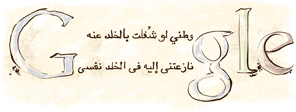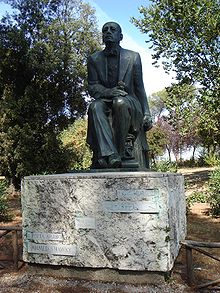hi friends,
today I cud see the logo of google when i opened the browser, which lead me to search in net for the cause, and the results are being appended hereunder ...
which lead me to search in net for the cause, and the results are being appended hereunder ...
regards..Raj. Kumar
This article is about the poet Ahmed Shawqi
Ahmed Shawqi (1868 - 1932) was one of the finest Arabic Language poets and dramatists who pioneered the modern Egyptian literary movement, most notably introducing the genre of poetic epics to the Arabic literary tradition. Shawqi also produced distinctive poetry that is widely considered to be the most prominent of the 20th century in Egypt. His family were of Kurdish origin and his parents were born and raised in Egypt.Life
Raised in a privileged setting, his family was prominent and well-connected with the court of the Khedive of Egypt. Upon graduating from high school, he attended law school, obtaining a degree in translation. Shawqi was then offered a job in the court of the Khedive Abbas II, which he immediately accepted.
After a year working in the court of the Khedive, Shawqi was sent to continue his studies in Law at the Universities of Montpellier and Paris for three years. While in France, he was heavily influenced by the works of French playwrights, most notably Molière and Racine.
He returned to Egypt in 1894, and remained a prominent member of Arab literary culture until the British forced him into exile in southern Spain,Andalusia, in 1914. Shawqi remained there until 1920, when he returned to Egypt. In 1927 he was crowned by his peers Amir al- Sho'araa(literally: the Prince of Poets) in recognition of his considerable contributions to the literary field.
He used to live in 'Karmet Ibn Hani' or Ibn Hani's Vineyard at Al-Matariyyah area near the palace of the Khedive Abbas II at Saray El-Qobba until he was exiled. After returning to Egypt he built a new house at Giza which he named the new Karmet Ibn Hani. He met Mohammed Abdel Wahab, and introduced him for the first time to art, making him his protégé as he gave him a suite in his house. The house later on became Ahmed Shawki Museum andMohammed Abdel Wahab became one of the most famous Egyptian composers.
WORK
Shawqi's work can be categorized into three main periods during his career:
- The first coincides with the period during which he occupied a position at the court of the Khedive, consisting of eulogies to the Khedive: praising him or supporting his policy.
- The second comprised the period of his exile in Spain. During this period, his feeling of nostalgia and sense of alienation directed his poetic talent to patriotic poems on Egypt as well as the Arab world.
- The third stage occurred after his return from exile: during that period he became preoccupied with the glorious history of Ancient Egypt and Islam. This was the period during which he wrote his religious poems, in praise of the Prophet Muhammad. The maturation of his poetic style was also reflected in his plays, the most notable of which were published during this period.

Monument of Shawqi in Villa Borghese, Rome
- Plays
Shawqi was the first in Arabic literature to write poetic plays. He wrote five tragedies:
- Magnun Laila (literally "The Madman of Layla"), his first play.
- The Death of Cleopatra, his most famous play.
- 'Antara
- Ali bek el-Kabeer
- Qambeez (Cambyses II), 1931
- and two comedies:
- Es-Set Huda (literally: Madam Huda)
- El-Bakhila (literally: the Miser)
- in addition to a prose play: the Princess of Andalusia.
- Poetry
- Esh-Shawqiyyat, his selected works, in four volumes, including Nahj al-Burda, a tribute to the Prophet Muhammad
- A long poem about the History of Islam, named The States of Arabs and the Great Men of Islam.
- Prose
Shawqi wrote several exquisitely written novels. A few survived. He also wrote chapters of prose, they are quite didactic, about diverse subjects, that might seem incoherent at a cursory glance and collected them under the title: the Markets of Gold.
- Novels
The Last Pharaoh, translated by Poet Ahmed Seddik
- Memory
Shawqi is celebrated in several parts of the world and in Egypt there is a monthly lecture series about his poetry at the Sawy Culturewheel. Google made a doodle for him on selected arabic-speaking countries on October 16th 2010 in honor of his memory.
Thanks & Regards, Raj. Kumar
www.keralites.net |
__._,_.___






No comments:
Post a Comment